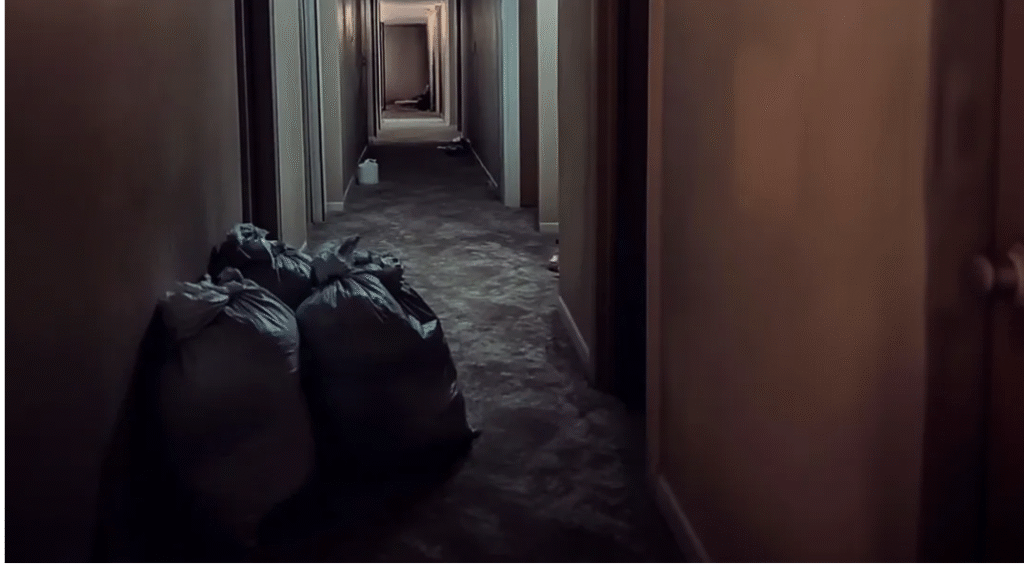
Trash bags outside an apartment’s door | Source: Amomama
When I moved into a new apartment seeking solace after losing my husband and our house, I didn’t expect to live next to the worst neighbor imaginable! She kept leaving her trash outside my door until karma took her through her paces, leaving her with a stern warning!
After my husband passed away, life didn’t just feel empty—it felt hollowed out, like someone had scooped out everything that made me who I was. While I thought the loss was difficult, my new neighbor made my grieving period even harder, until I couldn’t take it anymore.
She arrived three weeks after the funeral, carrying boxes of loud opinions and a voice that seemed allergic to silence. While I was curled inside the quiet cocoon of mourning, she played music that rattled my walls. Her laughter, too sharp and too frequent, sliced through my solitude like a blade. At first, I thought it was just bad timing—two lives brushing past each other at opposite poles of experience. But then it turned cruel.
She complained about my overgrown lawn when I could barely get out of bed. She left notes taped to my door about the garbage bins, about the fallen leaves, about the way my porch light flickered at night. Little things, maybe. But when you’re already drowning, even the smallest weight can pull you under.
One morning, I found her dog digging up the garden I’d planted with my husband—our last spring project together. I knelt there in the torn earth, trying to replant memories that would never bloom again, while she shouted from across the yard about property lines.
That’s when I snapped.

I, 42, and my husband had poured every ounce of ourselves into fighting for his life: the chemotherapy, the late nights in sterile hospital rooms, the insurance battles that left me crying at kitchen tables. In the end, we lost more than just a person—we lost the life we had built.
When the hospital bills came crashing in, I had no choice but to sell our three-bedroom house, the same one with the creaky stairs he used to joke would collapse under the weight of all the kids we’d have.
I moved into a modest townhouse across town, the kind of place that doesn’t have a past, just beige walls and a monthly HOA fee. I thought the emptiness would follow me, and it did—but it was joined by something else. Something louder, something meaner.
My new neighbor introduced herself by banging on my door the morning after I moved in. Not to say welcome. No. She was there to inform me that my moving truck had blocked her driveway. She didn’t ask. She didn’t smile. She didn’t see the hollowed-out woman standing in front of her with unbrushed hair and a sweatshirt that still smelled like antiseptic and grief.
From that moment on, she seemed to take issue with everything I did. My recycling bin wasn’t out early enough. My blinds were “closed all the time—it’s depressing.” Once, she told me I should “get out more,” as if grief could be cured by a trip to the farmer’s market.
It was a slow, relentless erosion. Death had taken my husband; she seemed determined to take whatever was left of my peace.
Until the day I finally broke.

A miserable woman lying in bed | Source: Pexels
I cried when I packed our life into cardboard boxes, and when I handed over the keys to a smiling young couple, I sobbed so hard I gave myself a migraine. With nowhere else to go, I moved into my late grandmother’s old apartment—a weary, second-floor unit in a building that smelled perpetually of boiled cabbage and desperation.
It was rent-free, at least, and full of memories. The floors creaked louder than my bones on cold mornings, and the walls were so thin I could hear my neighbor’s alarm clock buzz at 5:30 every morning. But it was a roof over my head, and I clung to it like a life raft. I told myself it was temporary, just until I got back on my feet.
Then she moved in.
Apartment 2B had been empty for months. I’d liked it that way. The silence next door gave me space to cry, to remember, to unravel in peace. But the day she arrived, dragging in bright yellow suitcases and barking orders at the poor movers, I knew my quiet days were numbered.
Her name was Marlene. She introduced herself with a knock I mistook for someone trying to break down the door. She talked fast, smiled hard, and looked me up and down like I was something she’d found growing under her sink. She told me she was divorced, loved yoga, and had “zero tolerance for nonsense”—which, I would soon learn, meant me.
She blasted music in the mornings, banged pots and pans at night, and once asked if I could “keep the crying down a bit” because she had an important Zoom meeting.
I hadn’t known it was possible to grieve more loudly in silence. But somehow, in the presence of Marlene, my grief grew teeth. And I wasn’t sure who I was angrier at—her, for being so obliviously alive, or myself, for letting her get to me.


